The Dallas Cowboys‘ decision to forgo signing star running back Derrick Henry during the offseason is increasingly viewed as a major misstep. After four games into the current season, Henry, who joined the Baltimore Ravens on a two-year, $16 million contract, is clearly outperforming the Cowboys’ backfield.
According to data from SB Nation’s RJ Ochoa, Henry has amassed an impressive 480 rushing yards and scored five touchdowns on 80 carries. In stark contrast, the Cowboys’ trio of running backs—Rico Dowdle, Ezekiel Elliott, and Deuce Vaughn—have collectively managed only 235 rushing yards and one touchdown on 65 attempts. This disparity highlights not only Henry’s individual excellence but also raises questions about the Cowboys’ running game and their overall strategy.
Henry, known for his powerful running style and ability to break tackles, has consistently been one of the top performers in the league. His ability to change the dynamics of a game is invaluable, and his performance thus far with the Ravens suggests that he remains a force to be reckoned with. The Cowboys, who currently hold a 2-2 record, might be feeling the impact of their choice, especially as they struggle to find a consistent offensive rhythm.

The Cowboys’ running back committee, while promising, has not been able to match Henry’s production. Ezekiel Elliott, who was once the focal point of the Cowboys’ offense, has seen his role diminish over the past seasons, and Dowdle and Vaughn have yet to make significant impacts. The combined efforts of these three backs highlight a troubling trend: the Cowboys are not effectively utilizing their rushing game, which is crucial in the NFL.
Moreover, with the Cowboys aiming for playoff contention, the absence of a dominant running back could prove detrimental as the season progresses. Relying on a less effective backfield can hinder the overall effectiveness of the offense, limiting their ability to control the clock and open up passing opportunities. As teams begin to hone in on the Cowboys’ offensive strategies, the lack of a reliable running threat could make it more challenging for the team to maintain offensive balance.
The decision to pass on Henry might not only be affecting the Cowboys’ immediate performance but could also have long-term implications for the franchise. As they look to the future, the Cowboys will need to assess their running back situation critically. The franchise may need to reconsider its approach to acquiring talent in key positions to avoid missing out on game-changing players like Henry.
In summary, the Cowboys’ choice to overlook Derrick Henry during the offseason is increasingly scrutinized, especially in light of his current success with the Ravens. The disparity in rushing statistics serves as a stark reminder of what might have been and raises significant questions about the Cowboys’ offensive strategy moving forward.
